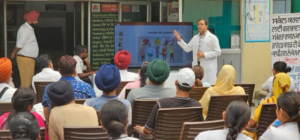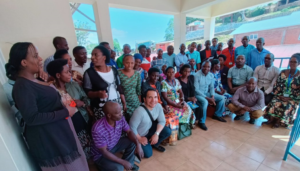The Global Surgery Unit was recently awarded additional Official Development Assistance (ODA) funding from the University of Birmingham and UK Research and Innovation to increase already existing community engagement activities across its Indian and Rwandan research Hubs.
The funding for the India Hub will be used to expand training for local ASHA community health workers (CHWs) on surgical wound management, stoma care and early cancer detection. According to the World Health Organisation, CHWs are healthcare providers who live in the community they serve and receive lower levels of formal education and training than professional healthcare workers such as nurses and doctors. They are key players in addressing the health needs of remote and marginalised low-to-middle-income (LMIC) country settings but traditionally have yet to have a role in post-surgical care. The funding will also be used to disseminate the recently co-developed patient education toolkit co-developed. Since last year, the India Hub has been engaging with ASHA workers and registered medical practitioners in different cities such as Ludhiana, Kolkata and Vellore which garnered the attention of the Punjab Civil Surgeon who tasked the Hub to train an additional 2,000 ASHAs.

On the other hand, the Rwanda Hub will be using its additional funding to expand on PIGEON (ImProving surgIcal care outcomes throuGh the active involvEment of cOmmunity in RwaNda)- a mixed method study that will initially scope CHW’s knowledge of surgical care and co-develop with them an intervention focused on improving surgical care outcomes through the active involvement of CHWs in both rural and urban regions of the country.

ODA is UK government aid that promotes and specifically targets the economic development and welfare of LMICs. Funding is provided through the International Science Partnerships Fund (ISPF) Institutional Support Grant (ODA), funded by Research England, Grant Reference: RE-CL-2023-09.
